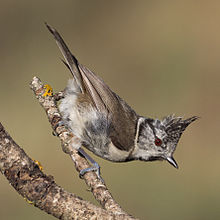
The great crested grebe is a member of the grebe family of water birds noted for its elaborate mating display.
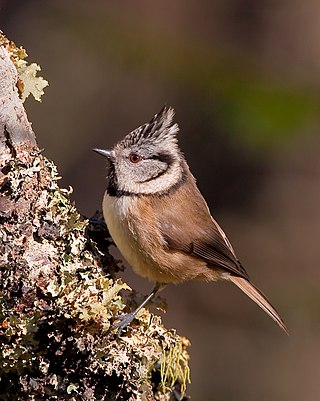
The tits, chickadees, and titmice constitute the Paridae, a large family of small passerine birds which occur mainly in the Northern Hemisphere and Africa. Most were formerly classified in the genus Parus.
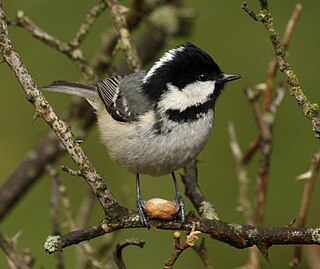
The coal tit or cole tit,, is a small passerine bird in the tit family, Paridae. It is a widespread and common resident breeder in forests throughout the temperate to subtropical Palearctic, including North Africa. The black-crested tit is now usually included in this species.
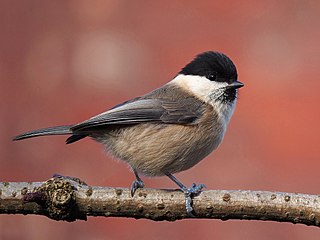
The willow tit is a passerine bird in the tit family, Paridae. It is a widespread and common resident breeder throughout temperate and subarctic Europe and across the Palearctic. The plumage is grey-brown and off-white with a black cap and bib. It is more of a conifer specialist than the closely related marsh tit, which explains it breeding much further north. It is resident, and most birds do not migrate.
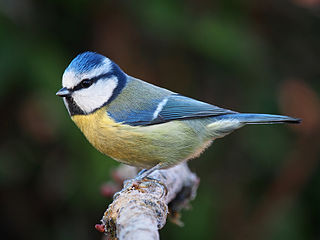
The Eurasian blue tit is a small passerine bird in the tit family, Paridae. It is easily recognisable by its blue and yellow plumage and small size.

The grey-headed chickadee or Siberian tit, formerly Parus cinctus, is a passerine bird in the tit family Paridae. It is a widespread resident breeder throughout subarctic Scandinavia and the northern Palearctic, and also into North America in Alaska and the far northwest of Canada. It is a conifer specialist. It is resident, and most birds do not migrate. Curiously, the bird has no grey on its head, which is black, white, and brown.

The Himalayan black-lored tit, also known as simply black-lored tit, is a passerine bird in the tit family Paridae. The yellow-cheeked tit is probably its closest relative, and it may also be related to the yellow tit. These three tits almost certainly form a distinct lineage, as indicated by morphology, and mtDNA cytochrome b sequence analysis.
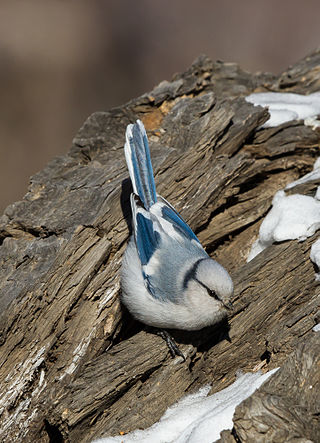
The azure tit is a passerine bird in the tit family Paridae. It is a widespread and common resident breeder throughout Russia and Central Asia and northwest China, Manchuria and Pakistan.

The Mexican chickadee is a small songbird, a passerine bird in the tit family Paridae. It is still often placed in the genus Parus with most other tits, but mtDNA cytochrome b sequence data and morphology suggest that separating Poecile more adequately expresses these birds' relationships. The American Ornithologists' Union had been treating Poecile as distinct genus for some time already.

The white-winged black tit is a passerine bird in the tit family Paridae. It is also known as the white-winged tit, dark-eyed black tit or northern black tit. The species was first described by Eduard Rüppell in 1840.
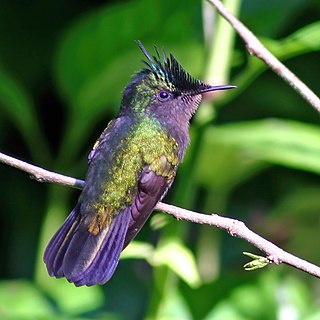
The Antillean crested hummingbird is a species of hummingbird in the family Trochilidae. Found across Anguilla, Antigua and Barbuda, Barbados, Dominica, Grenada, Guadeloupe, Martinique, Montserrat, north-east Puerto Rico, Saba, Saint-Barthélemy, Saint Kitts and Nevis, Saint Lucia, Saint Martin, Saint Vincent and the Grenadines, Sint Eustatius, the British Virgin Islands, the U.S. Virgin Islands, and the Lesser Antilles, while it has also been recorded as a vagrant in Florida, USA.

Baeolophus is a genus of birds in the family Paridae. Its members are commonly known as titmice. All the species are native to North America. In the past, most authorities retained Baeolophus as a subgenus within the genus Parus, but treatment as a distinct genus, initiated by the American Ornithological Society, is now widely accepted.

The grey tit is a species of bird in the tit family Paridae. It is found in Lesotho and South Africa. Its natural habitats are subtropical or tropical dry shrubland and Mediterranean-type shrubby vegetation.

Parus is a genus of Old World birds in the tit family. It was formerly a large genus containing most of the 50 odd species in the family Paridae. The genus was split into several resurrected genera following the publication of a detailed molecular phylogenetic analysis in 2013. The genus name, Parus, is the Latin for "tit".

The yellow tit, Taiwan yellow tit, or Formosan yellow tit is a species of bird in the family Paridae. It is endemic to central Taiwan.

Poecile is a genus of birds in the tit family Paridae. It contains 15 species, which are scattered across North America, Europe and Asia; the North American species are the chickadees. In the past, most authorities retained Poecile as a subgenus within the genus Parus, but treatment as a distinct genus, initiated by the American Ornithologists Union, is now widely accepted. This is supported by mtDNA cytochrome b sequence analysis.

Cyanistes is a genus of birds in the tit family Paridae. The genus was at one time considered as a subgenus of Parus. In 2005 an article describing a molecular phylogenetic study that had examined mitochondrial DNA sequences from members of the tit family, proposed that a number of subgenera including Cyanistes be elevated to genus status. This proposal was accepted by the International Ornithologists' Union and the British Ornithologists' Union.
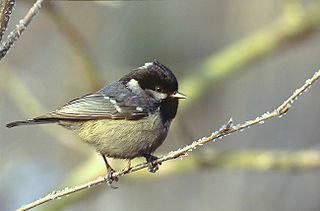
Periparus is a genus of birds in the tit family. The birds in the genus were formerly included in Parus but were moved to Periparus when Parus was split into several resurrected genera following the publication of a detailed molecular phylogenetic analysis in 2005. The name Periparus had been introduced for a subgenus of Parus that included the coal tit by the Belgium naturalist Edmond de Sélys Longchamps in 1884. The genus name, is Ancient Greek peri plus the pre-existing genus Parus.

The Indian black-lored tit, Indian tit, or Indian yellow tit is a passerine bird in the tit family Paridae. The yellow-cheeked tit is probably its closest relative, and both may be related to the yellow tit. These three tits almost certainly form a distinct lineage as evidenced by morphology, and mtDNA cytochrome b sequence analysis. The subgenus name Macholophus may apply for them.

Machlolophus is a genus of birds in the tit family. The species were formerly placed with many others in the genus Parus but were moved to Machlolophus based on a molecular phylogenetic analysis published in 2013 that showed that the members formed a distinct clade.
